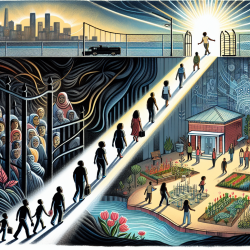Introduction
In a world where immigration policies often exacerbate social injustices, the role of various settings in supporting immigrant resistance becomes crucial. The research article titled The Roles of Settings in Supporting Immigrants’ Resistance to Injustice and Oppression: A Policy Position Statement by the Society for Community Research and Action offers valuable insights into how different environments can empower immigrants to resist oppressive systems. This blog will explore key findings from the article and provide actionable steps for practitioners to enhance their skills and support immigrant communities effectively.
Key Findings
The research highlights the multifaceted nature of oppression and the diverse ways in which immigrants and their allies resist it. Resistance occurs both individually and collectively, and across various settings, including:
- Community-based settings
- Faith-based organizations
- Direct care environments
- Educational institutions
- Municipalities and transnational organizing settings
These settings facilitate resistance by focusing on dismantling systems of oppression, addressing oppressors, and empowering those who are oppressed. The article situates its findings within frameworks of change through social settings, empowering settings, healing justice, and decolonization.
Implications for Practitioners
Practitioners working with immigrant communities can draw several lessons from this research:
- Empowerment through Education: Educational settings can serve as powerful tools for empowerment. Practitioners should focus on creating inclusive curricula that reflect the diverse backgrounds and experiences of immigrant students.
- Community Engagement: Building strong community networks is essential. Practitioners should facilitate community-based initiatives that encourage collective action and provide safe spaces for dialogue and resistance.
- Policy Advocacy: Practitioners should engage in policy advocacy to address systemic injustices. This includes working with local governments and organizations to create policies that protect and empower immigrant communities.
- Healing Justice: Incorporating healing justice practices into service delivery can help address the trauma experienced by immigrants. This involves recognizing the emotional and psychological impacts of oppression and providing holistic support.
Encouraging Further Research
While the article provides a comprehensive overview of the role of settings in supporting immigrant resistance, there is always room for further research. Practitioners are encouraged to explore the following areas:
- The impact of specific interventions within different settings on immigrant resistance
- The role of technology in facilitating resistance and empowerment
- Longitudinal studies to assess the sustained impact of resistance strategies
Conclusion
Understanding the role of settings in supporting immigrant resistance is crucial for practitioners aiming to create positive outcomes for immigrant communities. By implementing the findings from this research, practitioners can enhance their skills and contribute to a more just and equitable society. To delve deeper into the original research paper, please follow this link: The Roles of Settings in Supporting Immigrants’ Resistance to Injustice and Oppression: A Policy Position Statement by the Society for Community Research and Action.










